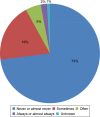Adherence in ulcerative colitis: an overview
- PMID: 28260866
- PMCID: PMC5328138
- DOI: 10.2147/PPA.S127039
Adherence in ulcerative colitis: an overview
Abstract
Medication adherence is an important challenge while treating chronic illnesses, such as ulcerative colitis (UC), that require a long-term management to induce and maintain clinical remission. This review provides an overview of the role that medication adherence plays in the routine management of UC, with a focus on the results of a recent Italian study reporting the perception of patients with UC regarding adherence to treatment. A literature analysis was conducted on topics, such as measurement of adherence in real practice, causes, risk factors and consequences of non-adherence and strategies, to raise patients' adherence. Most of the data refer to adherence to 5-aminosalicylic acid, and standard of care for the induction and maintenance of remission in UC. The adherence rate to 5-aminosalicylic acid is low in clinical practice, thus resulting in fivefold higher risk of relapse, likely increased risk of colorectal cancer, reduced quality of life and higher health care costs for in- and outpatient settings. There are various causes affecting non-adherence to therapy: forgetfulness, high cost of drugs, lack of understanding of the drug regimen - which are sometimes due to insufficient explanation by the specialist - anxiety created by possible adverse events, lack of confidence in physicians' judgment and complex dosing regimen. The last aspect negatively influences adherence to medication both in clinical trial settings and in real-world practice. Regarding this feature, mesalamine in once-daily dosage may be preferable to medications with multiple doses per day because the simplification of treatment regimens improves adherence.
Keywords: 5-ASA; adherence; mesalamine; once-daily; ulcerative colitis.
Conflict of interest statement
Disclosure The survey was supported by an unrestricted grant of Takeda. The authors report no other conflicts of interest in this work.
Figures
References
-
- Khan N, Abbas AM, Bazzano LA, Koleva YN, Krousel-Wood M. Long-term oral mesalazine adherence and the risk of disease flare in ulcerative colitis: nationwide 10-year retrospective cohort from the veterans affairs healthcare system. Aliment Pharmacol Ther. 2012;36(8):755–764. - PubMed
-
- Serup J, Lindblad AK, Maroti M, et al. To follow or not to follow dermatological treatment – a review of the literature. Acta Derm Venereol. 2006;86(3):193–197. - PubMed
-
- Kane SV. Systematic review: adherence issues in the treatment of ulcerative colitis. Aliment Pharmacol Ther. 2006;23(5):577–585. - PubMed
-
- Hawthorne AB, Rubin G, Ghosh S. Review article: medication non-adherence in ulcerative colitis – strategies to improve adherence with mesalazine and other maintenance therapies. Aliment Pharmacol Ther. 2008;27(12):1157–1166. - PubMed
Publication types
LinkOut - more resources
Full Text Sources
Other Literature Sources


